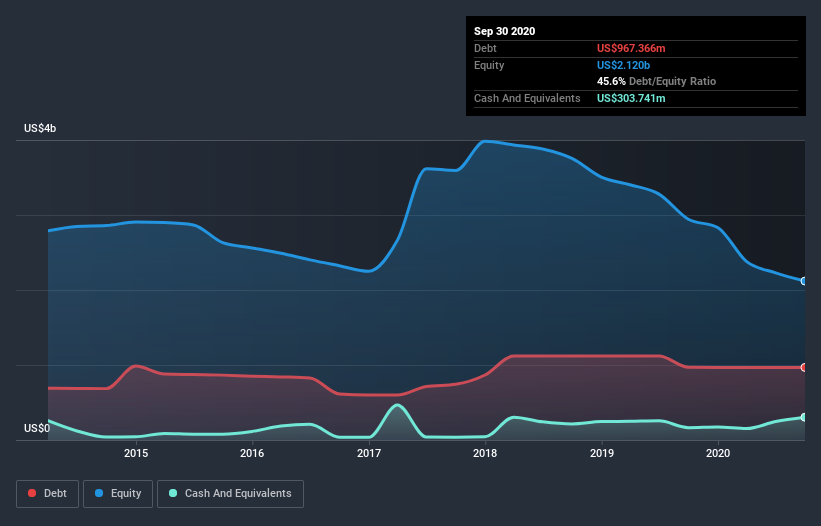- United States
- /
- Energy Services
- /
- NasdaqGS:PTEN
Patterson-UTI Energy (NASDAQ:PTEN) Is Carrying A Fair Bit Of Debt
The external fund manager backed by Berkshire Hathaway's Charlie Munger, Li Lu, makes no bones about it when he says 'The biggest investment risk is not the volatility of prices, but whether you will suffer a permanent loss of capital.' When we think about how risky a company is, we always like to look at its use of debt, since debt overload can lead to ruin. We can see that Patterson-UTI Energy, Inc. (NASDAQ:PTEN) does use debt in its business. But the more important question is: how much risk is that debt creating?
When Is Debt A Problem?
Debt is a tool to help businesses grow, but if a business is incapable of paying off its lenders, then it exists at their mercy. Part and parcel of capitalism is the process of 'creative destruction' where failed businesses are mercilessly liquidated by their bankers. While that is not too common, we often do see indebted companies permanently diluting shareholders because lenders force them to raise capital at a distressed price. By replacing dilution, though, debt can be an extremely good tool for businesses that need capital to invest in growth at high rates of return. When we examine debt levels, we first consider both cash and debt levels, together.
View our latest analysis for Patterson-UTI Energy
How Much Debt Does Patterson-UTI Energy Carry?
The chart below, which you can click on for greater detail, shows that Patterson-UTI Energy had US$967.4m in debt in September 2020; about the same as the year before. However, it also had US$303.7m in cash, and so its net debt is US$663.6m.

A Look At Patterson-UTI Energy's Liabilities
We can see from the most recent balance sheet that Patterson-UTI Energy had liabilities of US$263.4m falling due within a year, and liabilities of US$1.11b due beyond that. Offsetting this, it had US$303.7m in cash and US$136.1m in receivables that were due within 12 months. So its liabilities total US$931.8m more than the combination of its cash and short-term receivables.
This deficit is considerable relative to its market capitalization of US$1.15b, so it does suggest shareholders should keep an eye on Patterson-UTI Energy's use of debt. This suggests shareholders would be heavily diluted if the company needed to shore up its balance sheet in a hurry. There's no doubt that we learn most about debt from the balance sheet. But it is future earnings, more than anything, that will determine Patterson-UTI Energy's ability to maintain a healthy balance sheet going forward. So if you want to see what the professionals think, you might find this free report on analyst profit forecasts to be interesting.
Over 12 months, Patterson-UTI Energy made a loss at the EBIT level, and saw its revenue drop to US$1.4b, which is a fall of 50%. That makes us nervous, to say the least.
Caveat Emptor
Not only did Patterson-UTI Energy's revenue slip over the last twelve months, but it also produced negative earnings before interest and tax (EBIT). Its EBIT loss was a whopping US$407m. Considering that alongside the liabilities mentioned above does not give us much confidence that company should be using so much debt. Quite frankly we think the balance sheet is far from match-fit, although it could be improved with time. We would feel better if it turned its trailing twelve month loss of US$783m into a profit. So in short it's a really risky stock. The balance sheet is clearly the area to focus on when you are analysing debt. However, not all investment risk resides within the balance sheet - far from it. Case in point: We've spotted 2 warning signs for Patterson-UTI Energy you should be aware of.
Of course, if you're the type of investor who prefers buying stocks without the burden of debt, then don't hesitate to discover our exclusive list of net cash growth stocks, today.
If you’re looking to trade Patterson-UTI Energy, open an account with the lowest-cost* platform trusted by professionals, Interactive Brokers. Their clients from over 200 countries and territories trade stocks, options, futures, forex, bonds and funds worldwide from a single integrated account. Promoted
New: Manage All Your Stock Portfolios in One Place
We've created the ultimate portfolio companion for stock investors, and it's free.
• Connect an unlimited number of Portfolios and see your total in one currency
• Be alerted to new Warning Signs or Risks via email or mobile
• Track the Fair Value of your stocks
This article by Simply Wall St is general in nature. It does not constitute a recommendation to buy or sell any stock, and does not take account of your objectives, or your financial situation. We aim to bring you long-term focused analysis driven by fundamental data. Note that our analysis may not factor in the latest price-sensitive company announcements or qualitative material. Simply Wall St has no position in any stocks mentioned.
*Interactive Brokers Rated Lowest Cost Broker by StockBrokers.com Annual Online Review 2020
Have feedback on this article? Concerned about the content? Get in touch with us directly. Alternatively, email editorial-team (at) simplywallst.com.
About NasdaqGS:PTEN
Patterson-UTI Energy
Through its subsidiaries, provides drilling and completion services to oil and natural gas exploration and production companies in the United States and internationally.
Undervalued with excellent balance sheet.
Similar Companies
Market Insights
Community Narratives



